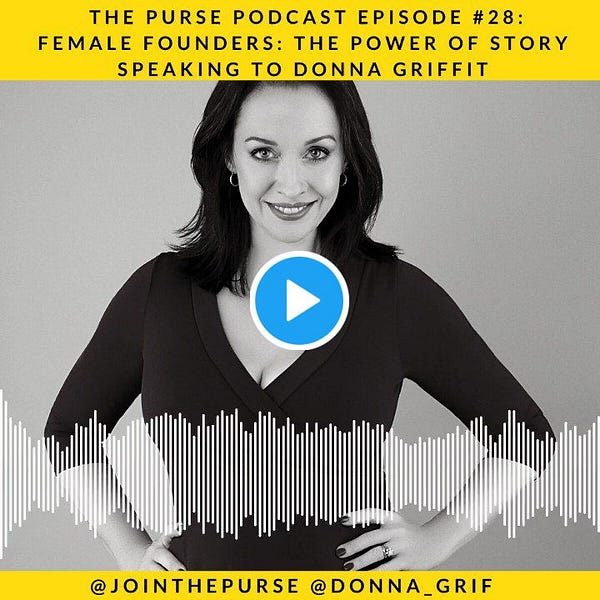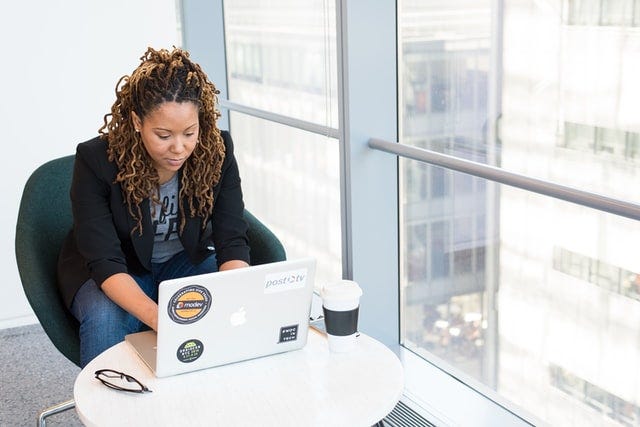Welcome to our #71 weekly newsletter.
“For women taking control of their financial future”
-Jana Hlistova
From The Purse
Dear Female Investor,
It’s great to have you in the community and thank you for being here.
I’m trialling a different format this week and I’d love your feedback.
My goal is to inspire you about money and investing within an awesome community of women. I will continue to evolve the content and format so it tunes with what women want and need when it comes to money and investing.
Drop me a line on jana@jointhepurse.com after you’ve read this and let me know what you think? Or just get in touch-I’d love to hear from you.
Enjoy your weekend & talk to you soon,
Jana
Mind the Gap: women’s pension is 50% less than men’s, according to report
And the gender pension gap….is widening
Women are exposed to more financial risk over the course of their lives.
On average, women earn less than men and have less money to invest. Women have more career interruptions, work in part-time or temporary employment and live longer than their male partner.
And we don’t need to remind you, that many marriages end in divorce and women stay single for longer (if they choose to marry at all).
(That’s without accounting for a pension system designed for men).
It’s no surprise that the financial consequences which compound over time, can be harsh for women in retirement.
A report by Legal & General says that the pension of women over 50 is half the size of men’s.
Here are the numbers:
Women have around £43,000 in private pots vs men who have £82,000.
25% of women over 50 have less than £5,000 (in their pension pot) vs only 15% of men who do.
Outside of pensions, women over 50 have on average £29,000 in savings vs men who have £40,000.
The Pandemic Has Made Things Worse
Women have been hit hardest by the pandemic. Many have lost their job or have had no choice but to opt-out of the workplace.
According to Oxfam, women lost more than 64m jobs last year because of Covid-19 and it cost women $800bn globally.
Newsweek has calculated that the pandemic could cost the typical American woman nearly $600,000 in income. Women who are college educated, earning an average of $62,000, could stand to lose $785,759 over a five year period.
This calculation is based on a loss of wage earnings, future growth and money for retirement.
In the UK, the Financial Conduct Authority found out that of those paying into their pension in February, 7% of women have stopped their contributions altogether compared to 5% of men.
The good news is, recent research suggests..
…44% of working aged women (UK) are ‘taking matters into their own hands’ (in the light of the gender pension gap), and 14% of women have already increased their monthly contributions as a result.
The report goes on to say that: ‘we need to consider fiscal, behavioural, and societal issues collectively, and work to create a more robust and inclusive pensions framework that offers fairer solutions for all’.
So what can women do to close the gender pension gap?
Learn more about pensions-make it your priority
Get clear on how much you have in your pension
Check out this retirement & pension calculator (by Legal & General)
Set a target and commit to (start) growing your pension
Find support-reach out to other women or speak to a financial advisor
Learn about other ways you can save and invest for your retirement.
Your future self will thank you for it.
News in Brief
Financial news
US President Joe Biden’s first budget would raise annual spending to $6trn (£4.3trn). The wealthy (earning $1m+) would see higher tax rates.
European stocks (Stoxx 600) hit an all-time high on Friday, as optimism over the economic recovery continues to lift share prices.
UK April borrowing reaches the second highest ever (£31.7bn) but less than last year ie £15.6bn less than in April 2020.
UK business is more upbeat about the economy (than anytime since 2016), according to a survey.
UK retail sales slowed in May after April surge (sales in April surged 9.2%)
Crypto: bitcoin, ethereum & DeFi
Bitcoin slumped approximately 7% again, the price is trading around $35,000. Price across digital tokens, including ether, fell as Bank of Japan Governor Haruhiko Kuroda joined a growing list of central bankers casting doubt over the crypto industry.
Iran’s government bans bitcoin mining and other crypto due to power outages (until 22nd September).
Goldman Sachs says that bitcoin is now considered ‘an investable asset class. It has its own idiosyncratic risk, partly because it’s still relatively new and going through an adoption phase.’
DeFi can transform global finance, says a report by Wharton School of Business. However the industry is exposed to risks because of the activity being concentrated on speculation, leverage, and yield generation among digital asset holders.
Billionaire hedge fund boss Ray Dalio buys bitcoin. (He also said that the US dollar is on the verge of devaluation and China threatens its role as the world reserve currency.
Todd Morley (co-founder & executive of investment powerhouse Guggenheim Partners) says that Ethereum has a higher utility than bitcoin through smart contracts.
The Bitcoin Mining Council: Michael Saylor (CEO of MicroStrategy & bitcoin evangelist) said he worked with Tesla CEO Elon Musk and a handful of North American miners to create a loose organisation that could publish energy usage data in bitcoin mining.
ETFs: Women & the ESG investing boom
The 2020s is set to be a watershed decade for women’s wealth.
As women continue to accumulate wealth faster than men and have far more capital at their disposal than ever before, it is likely that they will steer focus and investment to ESG, healthcare and education.
Women invest with impact
Research shows that women are far more interested in responsible or ESG investing. In fact, over 80%+ of women surveyed have said they want to invest for impact (Morgan Stanley survey).
This coupled with the fact that female professionals lead in the ESG space, with a growing presence in the ETF (exchange traded funds) industry, and the shift becomes much more, well, obvious.
Cathie Wood, founder, CEO & CIO of Ark Investment Management and Rebecca Chesworth, Head of Equities, ESG & Sectors for State Street Global Advisors are great examples. Both women leading in the ETF & ESG ETF space.
It follows that as more women join investment management-ETFs and beyond-supply and innovation in sustainable financial products will be led by women.
Exchange traded Funds (ETFS) & ESG
An ETF is a basket of companies which matches the market or index benchmark eg the S&P 500 or FTSE 100. It can track an index, sector, commodity, or other asset and can be purchased or sold on a stock exchange the same as a share.
A well-known example is the SPDR S&P 500 ETF. ETFs can be passive or actively managed.
ETFs account for a substantial growing share of ESG, with the largest ever inflows in 2020 (inflows quadrupled).
ESG investing is booming
The data shows that sustainable funds outperform more traditional funds. This has helped to quash the argument that there’s a financial trade-off for investors who want to focus on ESG (which has helped draw in more funds):
Since 2003, sustainable UK assets have grown almost 1,300%, from £2.9bn to £40bn at the end of the third quarter of 2020.
Responsible investment funds under management now totals over £56bn, growing 66% over the past 12 months, in comparison to 7% across funds overall.
In January 2021: £1.2bn was invested in responsible investment funds, £703m was invested in equity funds.
However, the sector is still in its infancy: despite the growth in the sector responsible investing only makes up 3%+ of the industry’s funds.
But measuring ESG impact…can be difficult
There is no uniform way to track a company’s ESG metrics, especially in the US. Pay practices and diversity does not have to be disclosed, unlike in the UK.
And there are many approaches to ESG investing, which means that funds can have very different practices. According to a Morningstar report, it’s well worth your time to research these funds before ‘jumping into them’.
How can women get started in ESG ETF investing?
Listen to the interview with Rebecca Chesworth for The Purse Podcast, Head of Equities, ESG & Sectors for State Street Global Advisors. We talk about ESG ETFs, responsible investing and how the industry is changing as more women invest their money.
Research ESG ETFs online & read about how they work.
Read Jessica Robinson’s book on sustainable investing (or listen to our interview on The Purse Podcast).
Dig deeper: read this report on ESG investing
The Purse Podcast


Female founders, fundraising and the power of story
I interviewed Corporate Storyteller, Donna Griffit about the ‘power of story’, how to build a good pitch, how to develop ‘the right mindset’ to raise millions, overcoming gender bias during fundraising and female investors.
And to complement the podcast interview, read this: Reclaim our voices: the rise of the female storytellers.
Coffee Break? Read This
How to make a brand name more appealing: give is a feminine name
Diverse teams feel less comfortable-and that’s why they perform better
The different words we use to describe male and female leaders?
We’d love to hear from you. Get in touch with Jana via the The Purse website or tweet @jointhepurse and @janicka.
The Purse Ltd. Copyright 2021 & All Rights Reserved.
The Purse provides content for informational purposes only, we do not provide product recommendations or investment advice. Please do your own research or speak to a financial advisor.

















Share this post